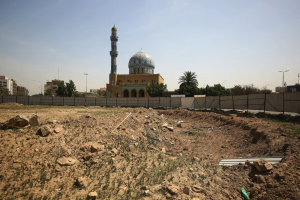This is the third installment in a short series from Today’s WorldView for the 20th anniversary of the 9/11 attacks. Sign up to get the rest of the newsletter free, including news from around the globe, interesting ideas and opinions to know, sent to your inbox every weekday.

There’s a scene in the 2014 film “American Sniper” that sums up the country’s post-9/11 war lust. Chris Kyle, the late U.S. Navy SEAL played by Bradley Cooper, watches a newscast of the twin towers crumbling before his eyes. The camera fixes on Kyle’s steely yet stunned face as he holds his shaken wife, before cutting to an image of him in full military gear, glaring through the scope of his sniper rifle in the middle of an Iraqi town. (He goes on to gun down a woman aiding Iraqi insurgents.)
The film, which some critics panned as proto-fascist agitprop, spends no time interrogating this implied connection between the events of 9/11 and the American decision to “preemptively” invade Iraq less than two years later to topple the regime of Iraqi dictator Saddam Hussein. Neither did much of the American public or political establishment that got swept up in the George W. Bush administration’s rush to punish “evil-doers.” A Washington Post poll in September 2003 found that close to 7 in 10 Americans believed that it was at least “likely” that Hussein was directly involved in the Sept. 11, 2001, attacks.
Advertisement
That, of course, proved to be preposterous, as was much of the case Bush and his allies made about the imminent threat posed by the Iraqi regime’s phantom weapons of mass destruction. Animated by a neoconservative zeal to oust enemy regimes and wield American might to make right — and unhindered by the bulk of the Washington press corps — the Bush administration plunged the United States and its coalition partners into a war and eventual occupation that would reshape the political map of the Middle East, distract from America’s parallel intervention in Afghanistan and provoke new cycles of chaos and violence.
The first couple of years after 9/11 marked “an era where the United States made major strategic errors,” Vali Nasr, a professor of international affairs at Johns Hopkins University’s School of Advanced International Studies, told Today’s WorldView. “Its vision was clouded by anger and revenge.”
But what if the United States had opted against invading Iraq? The decision to oust Hussein, even more so than the invasion of Afghanistan in the immediate aftermath of 9/11, was an unprovoked war of choice that, on one hand, sealed off a range of other policy options available to Washington’s strategists and, on the other, set in motion events that fundamentally altered the region. It’s impossible to unwind what the Bush administration unleashed, but indulge us at Today’s WorldView as we puzzle through just a few elements of this counterfactual proposition.
Advertisement
First and foremost, there’s the Iraqi death toll. The Watson Institute at Brown University calculates that 184,382 to 207,156 Iraqi civilians were directly killed in war-related violence between the start of the American invasion in March 2003 through October 2019. But the researchers suggest the real figure may well be several times higher.
Even considering Hussein’s own long record of brutality, it is difficult to envision a future of greater suffering for the Iraqi people had the United States not swept him from power, argued Sinan Antoon, a New York-based Iraqi poet and author.
“No matter what — and I say this as someone who was opposed to Saddam’s regime since childhood and wrote his first novel about life under dictatorship — had the regime remained in power, tens of thousands of Iraqis would still be alive today, and children in Fallujah would not be born with congenital defects every day,” Antoon told Today’s WorldView, alluding to the impact of U.S. forces allegedly using rounds of depleted uranium in their battles across Iraq.
Advertisement
Antoon added that we also would not have seen the rise of the Islamic State had the United States not invaded — a conviction shared by former president Barack Obama and echoed by myriad experts. “In the near term, the Iraqi political order probably would not have collapsed and created a void that nonstate or quasi-state actors could fill,” wrote international relations scholars Hal Brands and Peter Feaver in a 2017 study.
“The Sunni-Shia cleavage that has made Iraq so difficult to govern still would have been present,” they continued, “but without the violence, political chaos and Sunni marginalization of the post-invasion period, that cleavage would have remained in a less combustible state, and terrorist groups such as [al-Qaeda in Iraq] and [the Islamic State] would not have found such fertile ground for recruiting.”
Other paths were possible. In 2002, Shibley Telhami, a veteran pollster affiliated with the Brookings Institution and a professor at the University of Maryland, was part of a group of Middle East scholars based in the United States who opposed the Bush administration’s drumbeat to war in Iraq.
Advertisement
“Bush had a chance to build global coalitions, strengthen international norms and institutions, focus on the threat from al-Qaeda, reshape relations in the Gulf region and use domestic and international support to end the Palestinian-Israeli conflict, which, before 9/11, was the central grievance against the United States in the Middle East,” Telhami told Today’s WorldView.
Instead, he added, “Bush chose a policy of unilateralism,” pursuing a war that ravaged the Middle Eastern country, stoked sectarian violence and extremist militancy and “ended the balance of power between Iran and Iraq.” Iran’s gain from seeing its longtime foe fall in Baghdad, in turn, would reset the geopolitical calculations of Gulf Arab states, which became “so insecure that they embarked on destabilizing policies of their own, including the Yemen war,” said Telhami.
In 2003, the Iraqi regime still faced asphyxiating international sanctions. Had those eventually weakened — various countries apart from the United States were eager to bring Iraq out from the cold — the country’s youths would have been better linked to the world and an entrenched regime could have faced its own Arab Spring uprising.
Advertisement
Rasha al-Aqeedi of the Newlines Institute for Strategy and Policy, a Washington think tank, suggests an “Iraqi spring” would still have been brutally put down by the country’s Baathist government. “Saddam would have passed away and [his son] Qusay would have become president — an Iraqi version of [Syrian President Bashar] al-Assad, basically,” she told Today’s WorldView, imagining a milder end for the Iraqi dictator who was hanged in 2006. The status quo in Baghdad would have been “as stable as an authoritarian Baathist state can be.”
Alternatively, there could have been a steady internal unraveling, with the United States in a stronger position to support democratic and economic development, Amy Hawthorne, research director at the Project on Middle East Democracy, told Today’s WorldView. “Iraq, under punishing international sanctions and totalitarian rule for another decade, would have become a failed state, with parts of the south and Iraqi Kurdistan falling outside Saddam’s control.”
Instead, by 2007, the United States was compelled to deploy a “surge” of its troops to combat an Iraqi insurgency it would never quite quell. For multiple reasons, from feckless leadership to sectarian enmities, the government that the United States helped prop up in Baghdad would make a catalogue of its own mistakes. The occupation swiftly became a parable for American blundering and hubris.
“The U.S. was barely keeping its head above water during the surge,” Nasr said. “The aura of its power was gone.”
.. By Ishaan Tharoor
